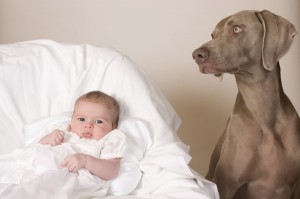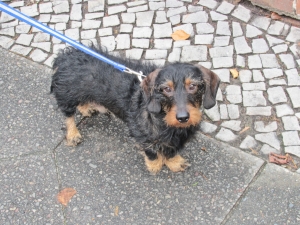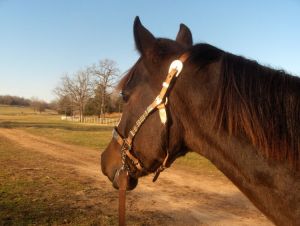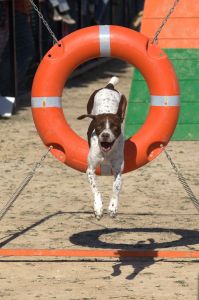 Most dog lovers would never dream of giving their beloved pup to someone else, but these feelings can change quickly when there is a baby on the way. While kids and dogs can be compatible, there’s no denying that canines, especially larger ones, are a legitimate risk to young children. Even the nicest dog will bite when he is frustrated by an unwitting toddler, and a playful pup may knock the baby over if he gets too excited.
Most dog lovers would never dream of giving their beloved pup to someone else, but these feelings can change quickly when there is a baby on the way. While kids and dogs can be compatible, there’s no denying that canines, especially larger ones, are a legitimate risk to young children. Even the nicest dog will bite when he is frustrated by an unwitting toddler, and a playful pup may knock the baby over if he gets too excited.
While some new parents find a new home for their dog rather than take the risk, that doesn’t mean you have to send the pooch packing. With a little preparation and supervision, you can safely keep your best furry friend after having a baby. Here are some suggestions and tips for keeping your baby safe around dogs.
The dangers of dogs around babies
You and your dog see different things when looking at a newborn. To your dog, the baby is just an over-sized squeaky toy that produces strange sounds and smells. Babies seem a lot like a squirrel or rabbit to your pup, so don’t assume he knows that the new inhabitant is your offspring. Surprisingly, some dogs also display aggression towards babies because they feel threatened.
“While prey drive can cause Rovers to bite tiny infants, the most common cause of bites to youngsters overall is actually fear,” according to Dr. Sophia Yin’s website. “This is generally very surprising, especially in cases where Fido loves all adults.”
Jealousy is also part of the picture. Canines are competitive creatures, and a new baby in the house means the pup isn’t getting as much attention as he was before. Jealous dogs may try to exert dominance over the baby forcefully or attempt to distract the parents when they are focused on their child.
Keep a happy dog and a safe baby
So, what can you do to keep the peace in a home with a dog and a young child?
There are a few basic tips for keeping your baby safe around dogs that animal experts and trainers agree on:
- Prepare your pup for big lifestyle changes before the baby actually arrives. Gradually spend less time with him for several weeks before bringing the baby home to help him get used to not being the center of attention all the time, according to Wake Forest Baptist Medical Center.
- Keep the dog out of the baby’s room in the weeks prior to her arrival so your pup knows that this area is off-limits. Control his entry and exit of the room at all times. “Eventually, you can allow your dog to explore and sniff certain things in the room—with your supervision,” according to Cesar’s Way. “Then you decide when she needs to leave. Repeat this activity a few times before the baby arrives.”
- Supervise all interactions between dog and child. This is particularly important for large dogs, but it also holds true for Bichons, Pomeranians and other small breeds. Keep your eye on your baby once she starts to crawl around.
- Exercise your dog every day. If you don’t have time to take him for a long and exhausting walk on a daily basis, ask friends or family members do it for you. You can also hire a dog walker to help your pup get exercise.
- Create a separate space for your dog that your child can’t get to. Just like people, canines value some time alone now and then, and they may get snippy if they have no way to escape from a curious kid.






Interesting read. When I was pregnant with my first child, Sara I used a book called Tell Your Dog You’re Pregnant: An essential guide for dog owners who are expecting a baby. It was really helpful and came with a CD of sounds. Max (my fur child!) took some time to get used to the sounds but the book helped on how to do it. It gave me advice on what changes will occur and how to prepare my Max for them. It also talked about the causes for aggression and why it might occur and how to avoid it. It is written by a vet behaviorist too so it cover health issues as well. Maybe that will help someone else!
Comments are closed.